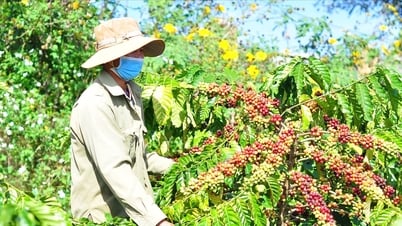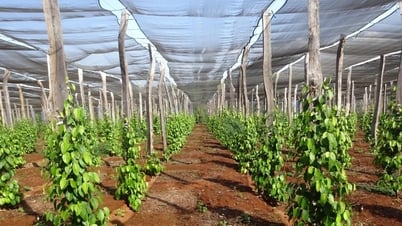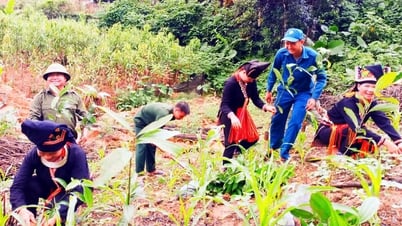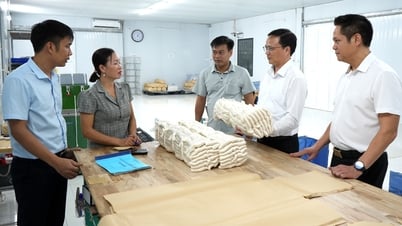At the end of 2024, storm No. 3 made landfall in Yen Bai, causing severe damage to agricultural production. Hundreds of hectares of rice and crops were flooded and lost. People faced the risk of losing their winter crop. In that context, a decision was quickly implemented: converting damaged rice areas to winter crops, especially corn, a crop that is both easy to care for and highly economically efficient.
Immediately after storm No. 3 passed, from support sources, the Department of Agriculture and Rural Development of the province (now the Department of Agriculture and Environment) quickly received and distributed crop seeds and fertilizers to localities at the right time, helping farmers immediately start production. Specifically: 47.6 tons of corn seeds, including: PSC102, PSC747, VINO 688, 9979C and 213 tons of fertilizers, including 193 tons of organic fertilizers and 20 tons of inorganic fertilizers (NPK).
To achieve success in winter-spring crop production, Yen Binh district mobilized the entire political system. The district People's Committee requested communes to establish and strengthen winter crop production steering committees, assigning tasks to each member in charge of villages and hamlets. The district promptly provided seeds and fertilizers to support people in expanding winter crop acreage.
Accordingly, Yen Binh has allocated 2,000 kg of various corn seeds, 10 tons of NPK fertilizer and 40 tons of organic microorganisms to 24 communes and towns. Thereby, this winter-spring crop, the whole district has planted 750 hectares of corn, reaching 100% of the plan, of which 50 hectares were allocated to increase according to the production recovery plan due to the impact of storm No. 3.
Thanks to the drastic participation of local authorities at all levels, the support of the agricultural sector and the determination of the people, the area of winter corn in the province reached nearly 6,746 hectares, an increase of 20.51% over the same period last year. The output reached nearly 23,417 tons, an increase of 21.93% (equivalent to more than 4,200 tons). This is an impressive increase in the context of production conditions still being affected by storm No. 3.
This sudden increase was mainly recorded in the districts of Van Yen, Tran Yen, Yen Binh, and Luc Yen, where farmers had early access to support policies for plant varieties and fertilizers, as well as being instructed in systematic farming techniques.
Mr. Tran Dinh Trong - Head of the Department of Agriculture and Environment of Van Yen district, shared: "We direct the communes to make the most of the land area for two rice crops to grow corn, not to let the land fallow. Every day of delay is another opportunity for the crop to be lost. It is a race against time".
To achieve such results, localities simultaneously established steering committees for winter crop production. Officials were assigned specific responsibilities for each village and hamlet. In many localities such as Luc Yen, Tran Yen, and Van Yen districts, the government not only provided agricultural materials but also directly guided people in improving the land, choosing suitable varieties, and cultivating with the right techniques.
In Vinh Kien commune, Yen Binh district, considered a bright spot in winter crop production, people no longer wait but proactively switch to growing corn after harvesting the summer-autumn rice. Ms. Nguyen Thi Thu in Chanh Yen village said: "My family grows winter corn every year, but this year we grow more because we have received support for seeds and fertilizers. Corn is not only for raising livestock but also for sale, the leaves are for feeding buffaloes and cows, the stems are used as fuel, there is no waste at all".
Not only supported by policies, Yen Bai farmers this year also demonstrated quick and sensitive adaptation to actual conditions. From land preparation, seed selection, planting to care, people have applied many technical advances to increase productivity. Hybrid corn varieties with high yield potential and short growing time have been put into mass production. Some good cultivation areas even exceeded the initial output plan. This is the foundation for sustainable development of Yen Bai province's agricultural production.
From the "flood" to the "golden season", corn has become a symbol of the resilience and adaptability of Yen Bai farmers. The story of this year's crop, therefore, is not simply a successful crop, but a lesson in how to overcome difficulties with solidarity, timely guidance and practical policies. Yen Bai's agricultural sector hopes to continue this recovery momentum in the following crops. And corn, from being a temporary solution, has become a new belief on the journey to get rich from the fields.
| In 2025, the whole province will reach nearly 6,746 hectares of winter corn, an increase of 20.51% over the same period last year. The output will reach nearly 23,417 tons, an increase of 21.93% (equivalent to more than 4,200 tons). This sudden increase is mainly recorded in the districts of Van Yen, Tran Yen, Yen Binh, and Luc Yen. The result is due to the drastic participation of the entire political system, and farmers' quick and sensitive adaptation to actual conditions. |
Hong Duyen
Source: https://baoyenbai.com.vn/12/349743/Bai-hoc-vuot-kho-tu-cay-ngo.aspx


![[Photo] President Luong Cuong presents the decision to appoint Deputy Head of the Office of the President](https://vphoto.vietnam.vn/thumb/1200x675/vietnam/resource/IMAGE/2025/5/8/501f8ee192f3476ab9f7579c57b423ad)

![[Photo] General Secretary To Lam begins official visit to Russia and attends the 80th Anniversary of Victory over Fascism](https://vphoto.vietnam.vn/thumb/1200x675/vietnam/resource/IMAGE/2025/5/8/5d2566d7f67d4a1e9b88bc677831ec9d)
![[Photo] Prime Minister Pham Minh Chinh meets with the Policy Advisory Council on Private Economic Development](https://vphoto.vietnam.vn/thumb/1200x675/vietnam/resource/IMAGE/2025/5/8/387da60b85cc489ab2aed8442fc3b14a)
![[Photo] National Assembly Chairman Tran Thanh Man chairs the meeting of the Subcommittee on Documents of the First National Assembly Party Congress](https://vphoto.vietnam.vn/thumb/1200x675/vietnam/resource/IMAGE/2025/5/8/72b19a73d94a4affab411fd8c87f4f8d)
![[Photo] General Secretary concludes visit to Azerbaijan, departs for visit to Russian Federation](https://vphoto.vietnam.vn/thumb/1200x675/vietnam/resource/IMAGE/2025/5/8/7a135ad280314b66917ad278ce0e26fa)

















































![[Photo] Prime Minister Pham Minh Chinh talks on the phone with Singaporean Prime Minister Lawrence Wong](https://vphoto.vietnam.vn/thumb/402x226/vietnam/resource/IMAGE/2025/5/8/e2eab082d9bc4fc4a360b28fa0ab94de)


























Comment (0)